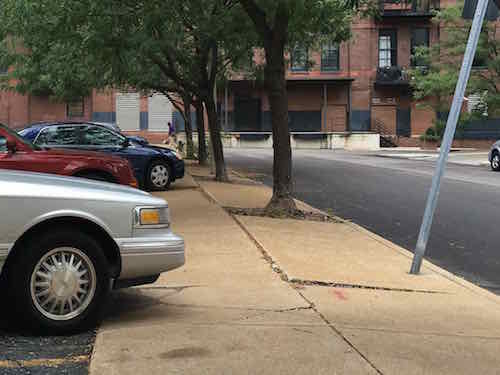Generic Form Letters Mailed To Owners Of Poorly Maintained Surface Parking Lot Notifying Them Of Code Violations
In May I posted about the parking lot to the East of my condo building, see Deplorable Surface Parking Lot At 1601 Locust Cited, Fined. The next month I submitted a request to the city for copies of the notice(s) sent to the owner. I’ve finally received them.

Here’s the timeline:
- Friday June 3 @ 9:09am: Emailed request to St. Louis’ centralized custodian of records.
- Wednesday June 8 @ 4:43pm: Reply from the city acknowledging the request, describing the process. “We anticipate completing this process during the week of June 13, 2016.”
- Tuesday June 21 @ 10:03am: I replied to followup on the status.
- Friday August 12 @ 11:02am: I replied again, but copied Maggie Crane in the mayor’s office, I wrote: “It’s been nearly three (3) months since my request was made. Guess I’ll have to file a complaint with the state…”
- Friday August 12 @ 11:46am: I received a reply from the custodian of records: “I apologize for the delay in getting back to you regarding your above-referenced Sunshine Law request. I appreciate your patience in this matter. Attached are the responsive documents.”
I was initially encouraged when I found out the city had centralized the request process, as opposed to having a person in each department be familiar with Missouri’s Sunshine Law and ensure compliance. I was disappointed I didn’t receive a response by the date they said I would. I was upset when I didn’t get a reply to my followup email. By the time I remembered in mid-August I was furious. I should’ve copied someone else on my initial followup of June 21st. Lesson learned.

Here are the documents I received:
I now know the name of the building inspector, we’ve talked by phone and are communicating. I’ve asked if the owner is being fined and if it can be sent to court for prosecution of the violations. I’m not an expert in these matters, but I don’t think mailing letters to an LLC in Illinois regarding a surface parking lot with the first sentence that reads “Thank you for choosing to live in the City of St. Louis” is an effective strategy.
I didn’t want to do this, but yesterday morning I emailed Carl Phillips at Parking Enforcement and asked them to warn/ticket people who end up over/on the sidewalk. After lunch I went out and the same two cars from 6 days earlier had something under their wiper.


Hopefully drivers will start paying attention, or will park elsewhere. If the owners lose enough business perhaps they’ll take action.
— Steve Patterson
b
b
b
The real business world doesn’t operate like the City of St Louis building violations division operates. A jersey barrier placed across all the entrances of the parking lot would probably bring this issue to a head in a matter of days. And to discourage curb jumpers, a sign warning that violators’ vehicles are subject to towing would probably dissuade doubters. Actual ENFORCEMENT would seal the deal! Imagine that!!! Most municipal “administrators” that I have had experience with lack business savvy and fail to follow standard business protocol, and there’s no expectation of accountability among these “administrators” and among those who support those “administrators”. There’s no standard that exists to evaluate job performance, and there are no investors or share holders in the next office insisting on competence, followup and success…and progress !!! Every private business I’m personally aware of requires employees to attend weekly or bi-weekly departmental meetings to follow up on each employee’s progress. When an issue goes unresolved over a certain time frame (MUCH LESS THAN 1 YEAR), the DEPARTMENT HEAD or his designee takes on the responsibility to move enforcement to the next level. I seriously question if such a meeting exists in the building violations department; otherwise, this violation would not have been allowed to continue for a year (6 months between notice 2 and notice 3)! THIS DOESN’T HAPPEN IN THE REAL WORLD!!!!
These and similar problems can be traced back half a century+. The good-ol’-boys place their friends in municipal jobs and a heavy democratic voting constituency continues to elect these people who really are quite incapable to maintain a legitimate administrative position in any private venue. Imagine how long Sharon Carpenter would survive in a private business venue! Imagine a general contractor continuing to employ a project manager who, over a period of a year, time after time, is unable to enforce a contractual requirement. From my experience, not long!
But this and similar failures and continued embarrassments will remain the norm in St Louis as long as voters continue to elect exclusively from a democratic hiring pool. The situation would be laughable if it weren’t so sad.
The letters mention occupancy being revoked — again, form letters. I asked the building inspector about shutting down the parking lot. He said that would be illegal. I don’t have the legal knowledge (yet) to argue that point.
If the language of the original ordinance states that a building or parking lot is subject to shut down with noncompliance, then it is not illegal. Any building can be condemned with cause. If a surface parking lot’s surface is not maintained and can present a hazard to the end user, I can’t imagine the City doesn’t have recourse to suspend usage until compliance is achieved. If the City doesn’t have this option in its ordinances, they need to clean out the entire legal division and replace it with 1st year law graduates who are still excited about practicing law and have a clue! Maybe even include a republican or an independent in the newly hired group! Absentee ownership and other property noncompliance issues have existed for YEARS in STL. You’d think that, in that time frame, some brilliant legal mind would have emerged with a solution to this and similar problems. The problem is that, at the end of the day, NO ONE IS BEING HELD RESPONSIBLE and there’s no “boss,” and with civil service protections, there’s little that can be done to enforce followup. St Louis is sick–but one fresh, creative administrator away from a come back. That one administrator is out there, but he may not be wearing a D on his left shirt-pocket.
Enforcement of code violations is weak: https://www.municode.com/library/mo/st._louis/codes/code_of_ordinances?nodeId=TIT25BUCO_CH25.33ENCOVI
Too many kissers and gummers at City Hall….no teeth! ……all part of the problem…..!
But this looks good — I just need to get the building division to do it. https://www.municode.com/library/mo/st._louis/codes/code_of_ordinances?nodeId=TIT8BUTALIRE_CH8.70PAST
I’m no lawyer, although I sometimes like to play like I am….but it looks to me that you have the goods to go after these guys. And if not, it would be interesting to hear reasons from the building inspection division why they don’t think you have sufficient cause.
Cities and their employees tend to pick their battles – not everything can be the priority that every citizen thinks something should be. This parking lot is generating revenue to the city; closing it would reduce that revenue stream. Nobody is going to die from falling in a pothole on private property; the city is likely far more concerned about pedestrians tripping on uneven sidewalks along the public ROW.
Yes, this should be a higher priority. Yes, better, more consistent enforcement would yield better compliance. But just like I don’t worry much about getting a speeding ticket in city (because the police have other issues that are more pressing, like guns, drugs, gangs and near-daily murders), the Building Inspection Division is more concerned with keeping people from getting killed in unsafe structures (both new and old), than they are in the aesthetic degradation of surface parking lots. Compared to your concerns, here, I’m way more concerned about what happened here: http://fox2now.com/2016/08/29/concrete-falls-from-downtown-building-smashes-car/
What revenue? Property taxes?
Prioritization isn’t as important when an inspection program is thorough, well structured, when building operators are held accountable for their building violations and where those who fail to comply are fined and given x-days to make corrections. When this happens, actions performed by a building inspection division become part of a well-developed routine and don’t have to be prioritized. The lot in Steve’s post has been a giant code violation for years–long before the first notice was sent out last year! I can’t remember the last time when that lot was actually striped! On that parcel, there is no lighting, no landscaping, no perimeter curbs, probably no MSD approved drainage, no perimeter fencing. Yet cars park on it daily. It’s almost a slap in the City’s face! Correcting violations should be a challenge for the building owner/.operator, not for the entity issuing the citation. It just seems like STL is structured in such a way that the city jumps through hoops to finally alert the building owner of a violation, and then the building owner takes his sweet time making the corrections, if at all. What’s that all about, anyway?
Yes, chunks of facade falling off a building, overhead, is a major issue and concern. Considering the age of many of downtown’s buildings and the fact that for years, they were neglected, STL should employ more building inspectors who have the training to recognize these and other structural failures that compromise a building’s integrity. Building inspectors can be “trained” and taught what to look for, signs of building stress, etc, just like a Labrador Retriever support dog is trained to recognize medical issues. Neither the inspector nor the Labrador needs to understand the cause of the potential problem. They just need to know that something odd is happening that needs to be investigated. When’s the last time you or anyone else has seen a city inspector with a pair of binoculars looking up at the parapet or cornice 15 levels above he sidewalk?
In most downtown cities, I’ve learned to not look up! Conditions exist on almost every structure (as you stated, OLD and NEW alike) that make me want to walk on the other side of the street–but usually it’s just as bad if not worse over there. I usually walk as close to the street curb as I can, and I vow never to walk out onto a balcony of any kind, or especially onto a wood deck.
There’s no excuse for the lack of enforcement.
A story: when I was in college, I lived in a series of houses that were old and in constant need of repair. The town of Amherst had a biannual inspection program for rental property: they came in August and January and basically crawled up the owner’s ass to check for health and building code violations. If you were in violation, and it wasn’t something that could be fixed right there, the house was closed. No X days to fix it, no negotiating. At sunset they would strap padlocks to all the doors and at dawn they came back to remove them, and during daylight you could make repairs to the house. It didn’t matter if your tenants were homeless in the interim, that was not the town’s problem.
It was annoying at the time (although I was eventually able to extract my rent and damages out my landlord), but now I appreciate the inspectors’ backbone. The code was the code was the code, and they did not bend for anyone.
Small college town with adequate (significant?) resources / cash flow / tax revenues versus a struggling rust belt city . . . not exactly an apples-to-apples comparison . . .
Sending out poorly written form letters every time a citizen complains isn’t a good use of limited resources. Barricading the lot per the city code would be.
It’s all about priorities: http://www.denverpost.com/2016/09/13/denver-disabled-parking-crackdown-budget/
Actually, my first impression upon reading your post is that Amherst’s policy is a bit harsh. But I’d lay odds that the policy has evolved over the years, that it probably didn’t start out so rigid. Amherst’s policy better protects the students, gives parents a peace of mind that they might not have otherwise, and it puts the onus on the landlord to achieve compliance–just where it should be. I applaud Amherst! I’ve been visiting colleges lately with my son who will begin his freshman year in August 2017, and student housing in so many of these college towns is deplorable at best. We visited a “college house” at Rice in Houston that I wouldn’t house my goats in! At another “college house” in Rochester, the windows are so inadequate (loose, single pane, uncaulked, rotting, with broken glass etc) that it would be impossible to heat the “house” most of the school year. It’s good that the folks at Amherst have their act together.
In Boulder, one of their rules is no indoor furniture (couches) on porches . . . college town “problems” . . . http://www.dailycamera.com/cu-news/ci_15747240
Ha! Where I grew up, at households in residential neighborhoods where indoor furniture is being replaced, it is not uncommon to see the old furniture moved to the front porch (or to the yard) for a few more years’ use! It’s also not uncommon to see old kitchen ranges moved to a covered porch (front porch or back porch, doesn’t matter!) to be used for “outdoor grilling”, Vehicles (mostly pick-em-up trucks) are frequently parked in the yard as close to the front door as possible, even when a nearby driveway is available and empty. A half filled drain pan and used oil filter might be sitting next to the truck, left over from last week’s oil change. In those cases, at least they a drain pan had been used! Every geographic area has its challenges to deal with. You can imagine the culture shock I experienced when I moved to St Louis Hills right out of college!!!